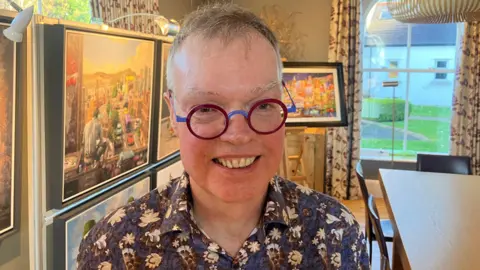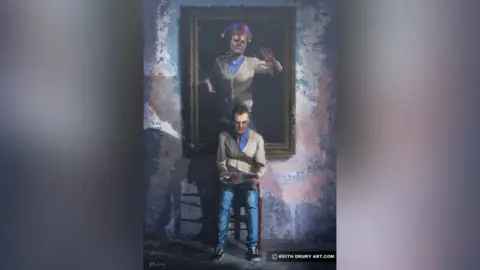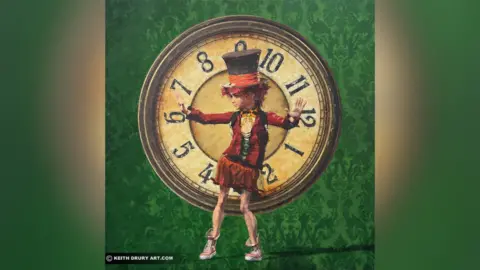Former church minister creates art reflecting on his autism
 BBC
BBCA former Belfast minister who was diagnosed with autism in his late 50s said he spent many years "masking" his condition.
Keith Drury told BBC News NI that it helped him cope with a profession that involved a lot of social contact.
"I learned that meeting people was quite difficult, and saying the first words, saying 'hello', I found quite hard," he recalled.
"So I learnt then by watching my friend, who was extremely confident."
Research has suggested that, like Keith, there are many other adults who do not know they are autistic.
In Northern Ireland, the Autism NI Helpline has seen a 400% increase in demand over the past four years from adults seeking support.
A recent study of primary care records in England, for instance, suggested that over 250,000 people over the age of 50 may be autistic but undiagnosed.
'I learned to mask my autism'
Keith worked in the health service before becoming a Presbyterian minister in Belfast for almost two decades.
"I'm autistic, and through those years in the church, they were probably very stressful years," he said.
"Even getting up each time in the pulpit was masking in many ways.
"I thought it would not require any public speaking; I was quite confident of that.
"It didn't quite work out like that!"
 Keith Drury Art
Keith Drury ArtHaving left the ministry Keith is now a successful artist, and his latest collection of paintings 'We're All Mad Here' reflects on neurodiversity and his own autism.
It was a big step to decide to become a full-time artist, but Keith said he "can't remember a time when I didn't paint".
"Going back to childhood, I think I captured every Disney character I could find," he said.
"I've always drawn ever since I was young."
Keith's paintings, especially those of brightly lit and detailed streetscapes in Northern Ireland, are well known.
He told BBC News NI that his decision to leave his career as a church minister to take up art full-time was about "recovery, it was also about survival".
"I exhibited all the normal things that you would expect with an autistic person, but I had learnt also through the church very cleverly to mask most things," he said.
It was only when Keith's wife Deborah completed a doctorate in how technology could help reduce anxiety among autistic children, though, that he realised he may also be autistic.
The couple were also patrons of their local branch of the National Autistic Society charity.
Eventually it led him to seek a referral from his GP for an assessment.
"We thought, 'Well, OK, maybe that's what explains my history from five years of age and all the things that I've been trying to learn to control, things I've been learning to mask,'" he said.
 Keith Drury Art
Keith Drury ArtKeith said his autism diagnosis made sense of a lot of things he had experienced since childhood.
At school he had been branded "lazy".
"From going right back to having late speech development in school, to having a lot of tics that I had to try and control," he said.
As he got older, he watched how other people dealt with social situations to help overcome his own anxiety.
"I had a friend who was extremely good with people, everybody loved him and I would watch how he worked with people, how he spoke to people, how he met people," he said.
"I would kind of copy that and learn.
"So I was aware my whole life there was all this going on."
 Keith Drury Art
Keith Drury Art"I think I'd felt like my whole life I'd been writing the book, but never had the preface or never had the table of contents that made sense of the book," he told BBC News NI.
"All of a sudden this made sense and, to a degree, I think it took some of the pressure off me.
"I've always been very, very hard on myself if I failed in any kind of way or made mistakes.
"And I think the diagnosis of the autism allowed me to be a little bit easier on myself by understanding where much of this was coming from."
As Keith was a patron of the National Autistic Society he felt that going public about his late diagnosis could help others.
"Even to say to parents that this is not a negative thing, autism is a very broad spectrum," he said.
The striking paintings in 'We're All Mad Here' reflect his experiences and focus on mental health.
"Everyone is somewhere on some kind of spectrum," he said.
"There's no perfect human being, we're all strong in certain areas."
The title of the exhibition is based on a phrase from Lewis Carroll's Alice's Adventures in Wonderland, and many of the paintings are based around the famous tale.
"At a simple level many of us feel we don't fit," Keith said.
Increasing awareness of autism
Ema Cubitt is the Independent Autism Reviewer for Northern Ireland and she said that a diagnosis of autism in adults is becoming more prevalent.
"One of the key factors driving this increase is the growing recognition that autism is a natural variation within the human population," she told BBC News NI.
"Several factors are likely to contribute to this rise in diagnosis, including increased awareness and recognition, evolving diagnostic criteria, improved reporting and data collection, and broader social and cultural shifts.
"As we deepen our understanding of autism, we gain valuable insights into the diversity of human experiences, which can only serve to enrich our society.
"The impact of a diagnosis varies from person to person, and autistic adults themselves provide the most powerful insights into what it means to receive this recognition later in life.
"We must ensure that our public services, including education and healthcare, evolve to meet the needs of autistic individuals, and that society as a whole fosters greater acceptance and support."
